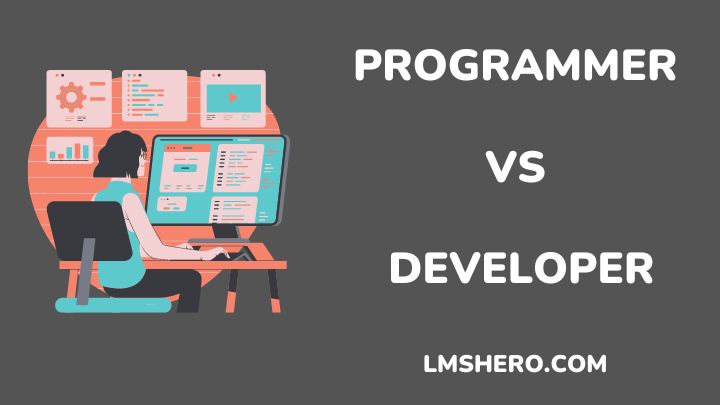Although a programmer and developer share similar roles and skills, they are two different careers.
While a programmer is a technician specializing in writing code, a developer, on other hand, is a designer or project manager who can also code.
So, if you are contemplating a career in either, it is essential to understand what these two professions have in common and what makes them different.
In this article, I will explore the core responsibilities of programmers and developers and discuss their significant similarities and differences.
So, read on to learn more.
Who is a Programmer?

A programmer is a coding professional who makes, tests, and troubleshoots different coding languages within a software application to ensure they function correctly and give the correct result.
Most programmers have diverse computing and coding backgrounds, including Structured Query Language (SQL), Perl, Extensible Markup Language (XML), PHP, HTML, C, C++, and Java.
However, a programmer can specialize in one or more areas, such as database, security, software/firmware/mobile, or web development.
SEE: Specialist vs. Analyst: Definitions, Differences, & Advantages
Who is a Developer?

A developer is a professional who writes, manages, and debugs codes in computer programs.
Typically, developers specialize in a specific programming language and manage other related tasks to software development, such as software documentation, architecture, databases, user experience, etc.
Programmer vs. Developer: Differences
The following are the differences between a programmer and a developer:
1. Scope of work
Developers often have a more extensive range of responsibilities compared to programmers.
In addition to writing and reviewing codes, developers mostly manage software projects, delegate duties to other coding specialists, design software with the customer experience in mind, and so on.
Programmers, on the other hand, primarily concentrate on writing, debugging, and testing their code.
However, programmers are often more familiar with specific coding languages, techniques, and debugging procedures than developers.
2. Area of Specialization
Sometimes, both developers and programmers specialize in a subset of their field. However, these specializations vary between the two professions.
Specializations for programmers include the following:
- Application programmers: Application programmers are responsible for building software designed to do specific tasks. For instance, an application programmer can write codes for financial calculations and evaluation programs.
- System programmers: System programmers specialize in software that aids in the maintenance of computer system software, such as database management or operating systems.
- Artificial intelligence (AI) and Machine Learning engineers: They write code for systems designed to improve efficiency. For instance, they may develop chatbots to respond to typical client questions or concerns.
- Game programmers: A game programmer produces and edits the source code for web, console, and other video games.
SEE: See What IT Stands For In The Computer Industry
Developers, on the other hand, specialize in different fields, such as:
- Mobile developers: They create applications for mobile devices such as smartphones and tablets. Frequently, they specialize in making applications compatible with a specific platform.
- Full-stack developers: They can make and manage both the front-end and back-end of software development. This means they can influence the user experience and how the code operates in the background.
- DevOps developers: They are specialized in both software development and IT operations. A DevOps engineer facilitates collaboration between software development and operations or maintenance teams.
- UI/UX developers: They are concerned with how the customer interacts with the final product. They modify software designs to make the layout simpler for customers to understand and test software to make changes.
SEE: How to Make Money With Software Development
3. Salary
According to the Bureau of Labor Statistics, computer programmers make an average of $93,000 per annum, while software developers earn an average of $120,730 yearly.
Developers are presumably in a more advanced position than programmers, which likely contributes to the disparity in annual compensation.
However, earnings can vary according to geography, years of experience, and education, among other considerations.
SEE: Computer Science Fields That Pay Most
4. Different career paths
Developers and programmers pursue their respective careers through similar but unique means. Generally, before their careers, they earn a bachelor’s degree in computer science or a related field.
However, a developer role is often not an entry-level position, so they mostly spend a few years in another career obtaining programming knowledge.
Some developers even start their careers as programmers to ensure they have a solid grasp of programming languages. Some also begin their careers as junior web developers or data analysts.
On the other hand, programmers who have broad business experience can become computer systems analysts, while some may become software developers. They can also be promoted to managerial positions.
SEE: IT Analyst Job Roles, Requirement, Skills Involved & Job Outlook
Programmer vs. Developer: Similarities
1. Similar job responsibilities
Developers and programmers share a portion of their duties. Both professionals write, revise, test, and troubleshoot code to ensure that software programs function optimally.
Developers and programmers can also organize software data, use encryption or security mechanisms to safeguard their software, and test its compatibility with multiple operating systems.
2. Similar work environment
Both developers and programmers frequently collaborate with other computing professionals in an office setting.
Programmers are more likely to work part-time or full-time from home when they receive coding instructions. They can always complete their job from any location.
However, since developers communicate with people more regularly, it is more typical for them to work on-site but can be remote as well.
3. Share similar skills
Developers and programmers are both proficient at coding. Typically, they can write, test, and debug several programming languages.
Developers typically have less specialized knowledge of the technical aspects of coding than programmers. However, they have similar technical expertise in document management, data organization, etc.
Programmers and developers frequently share comparable soft skills or personality qualities and work-related activities such as teamwork, adaptability, communication, critical thinking, etc.
SEE: Crucial Soft Skills Every Professional Needs
4. Teamwork
Programmers and developers frequently work in groups. However, a programmer can work alone for extended periods.
Programmers may utilize their team to discuss software concepts or code challenges, but they must independently complete their coding assignments.
Developers generally supervise a team of programmers, designers, IT workers, other computing specialists, and other departments, such as marketing or sales, to ensure that their products provide clients with a smooth experience.
SEE: Some Teamwork Skills You Should Possess
FAQs
What makes a good developer?
Skills such as solid technical knowledge, the ability to learn fast, good communication skills, good time management skills, etc.,
Is programming a promising career?
Yes, programming is an outstanding and rewarding career with a flexible work schedule and multiple career opportunities.
Can you become a programmer without a college degree?
Yes, you can.
You can learn by yourself or enroll in coding boot camps.
What are some of the challenges developers face?
Developers face challenges such as project infrastructure, undefined quality standards, adapting to the latest market trends, system and application integration, project management, security infrastructure, etc.
Conclusion: Programmer vs. Developer
While there are clear advantages to being a programmer, there are also many advantages to being a developer.
Differences between the two disciplines can be summed up with a few key points: Developers are experts in code and software development, while programmers focus on the logic of the program.
Developers are more likely to work in multidisciplinary teams, while programmers work alone. Many developers start as programmers and advance to developer roles if they want more responsibility and bigger pay.
However, a great programmer does not always make an outstanding developer.
I hope you found this article helpful. You can also read to know what to do with a degree in computer science.
Thanks for reading.







